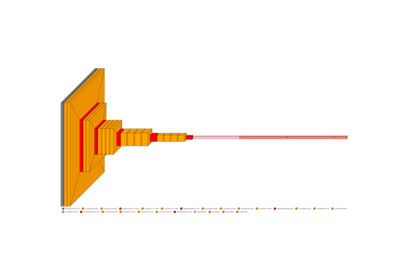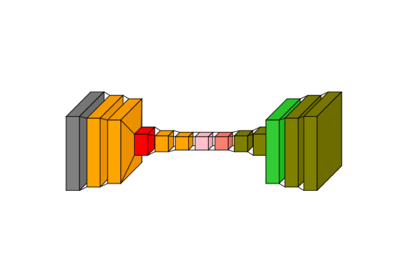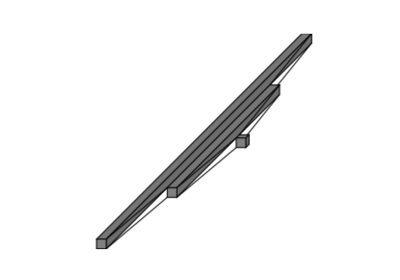visualkeras: EfficientNetV2 example#
An example showing the visualkeras function
used by a tf.keras.Model model.
# Authors: The scikit-plots developers
# SPDX-License-Identifier: BSD-3-Clause
# visualkeras Need aggdraw tensorflow
# !pip install scikitplot[core, cpu]
# or
# !pip install aggdraw
# !pip install tensorflow
# pip install protobuf==5.29.4
import tensorflow as tf
# Clear any session to reset the state of TensorFlow/Keras
tf.keras.backend.clear_session()
from scikitplot import visualkeras
model = tf.keras.applications.EfficientNetV2B0(
include_top=True,
weights=None, # "imagenet" or 'path/'
input_tensor=None,
input_shape=None,
pooling=None,
classes=1000,
classifier_activation="softmax",
name="efficientnetv2-b0",
)
# model.summary()
img_efficientnetv2 = visualkeras.layered_view(
model,
legend=True,
min_z=1,
min_xy=1,
max_z=4096,
max_xy=4096,
scale_z=0.01,
scale_xy=10,
font={"font_size": 99},
# to_file="result_images/efficientnetv2-b0.png",
save_fig=True,
save_fig_filename="efficientnetv2-b0.png",
)
img_efficientnetv2

<matplotlib.image.AxesImage object at 0x7fe26822ca90>
# model = tf.keras.applications.EfficientNetV2B1(
# include_top=True,
# weights=None, # "imagenet" or 'path/'
# input_tensor=None,
# input_shape=None,
# pooling=None,
# classes=1000,
# classifier_activation="softmax",
# name="efficientnetv2-b1",
# )
# visualkeras.layered_view(
# model,
# legend=True,
# show_dimension=True,
# to_file='result_images/efficientnetv2-b1.png',
# )
# model = tf.keras.applications.EfficientNetV2B2(
# include_top=True,
# weights=None, # "imagenet" or 'path/'
# input_tensor=None,
# input_shape=None,
# pooling=None,
# classes=1000,
# classifier_activation="softmax",
# name="efficientnetv2-b2",
# )
# visualkeras.layered_view(
# model,
# legend=True,
# show_dimension=True,
# to_file='result_images/efficientnetv2-b2.png',
# )
# model = tf.keras.applications.EfficientNetV2B3(
# include_top=True,
# weights=None, # "imagenet" or 'path/'
# input_tensor=None,
# input_shape=None,
# pooling=None,
# classes=1000,
# classifier_activation="softmax",
# name="efficientnetv2-b3",
# )
# visualkeras.layered_view(
# model,
# legend=True,
# show_dimension=True,
# to_file='result_images/efficientnetv2-b3.png',
# )
# model = tf.keras.applications.EfficientNetV2S(
# include_top=True,
# weights=None, # "imagenet" or 'path/'
# input_tensor=None,
# input_shape=None,
# pooling=None,
# classes=1000,
# classifier_activation="softmax",
# name="efficientnetv2-s",
# )
# visualkeras.layered_view(
# model,
# legend=True,
# show_dimension=True,
# to_file='result_images/efficientnetv2-s.png',
# )
# model = tf.keras.applications.EfficientNetV2M(
# include_top=True,
# weights=None, # "imagenet" or 'path/'
# input_tensor=None,
# input_shape=None,
# pooling=None,
# classes=1000,
# classifier_activation="softmax",
# name="efficientnetv2-m",
# )
# visualkeras.layered_view(
# model,
# legend=True,
# show_dimension=True,
# to_file='result_images/efficientnetv2-m.png',
# )
# model = tf.keras.applications.EfficientNetV2L(
# include_top=True,
# weights=None, # "imagenet" or 'path/'
# input_tensor=None,
# input_shape=None,
# pooling=None,
# classes=1000,
# classifier_activation="softmax",
# name="efficientnetv2-l",
# )
# visualkeras.layered_view(
# model,
# legend=True,
# show_dimension=True,
# to_file='result_images/efficientnetv2-l.png',
# )
Total running time of the script: (0 minutes 4.185 seconds)
Related examples




